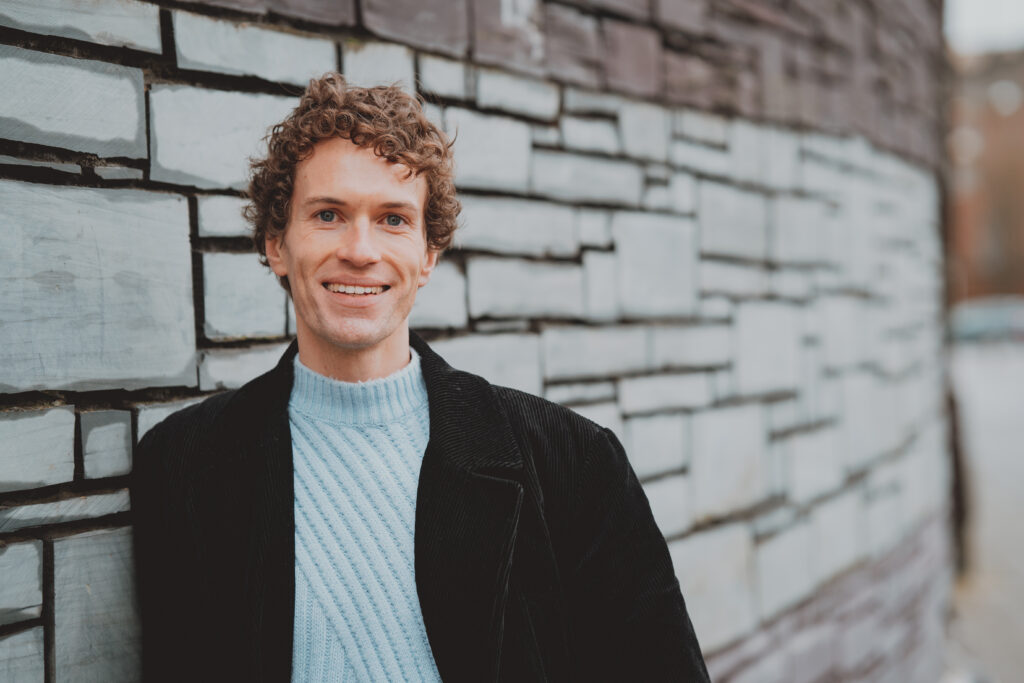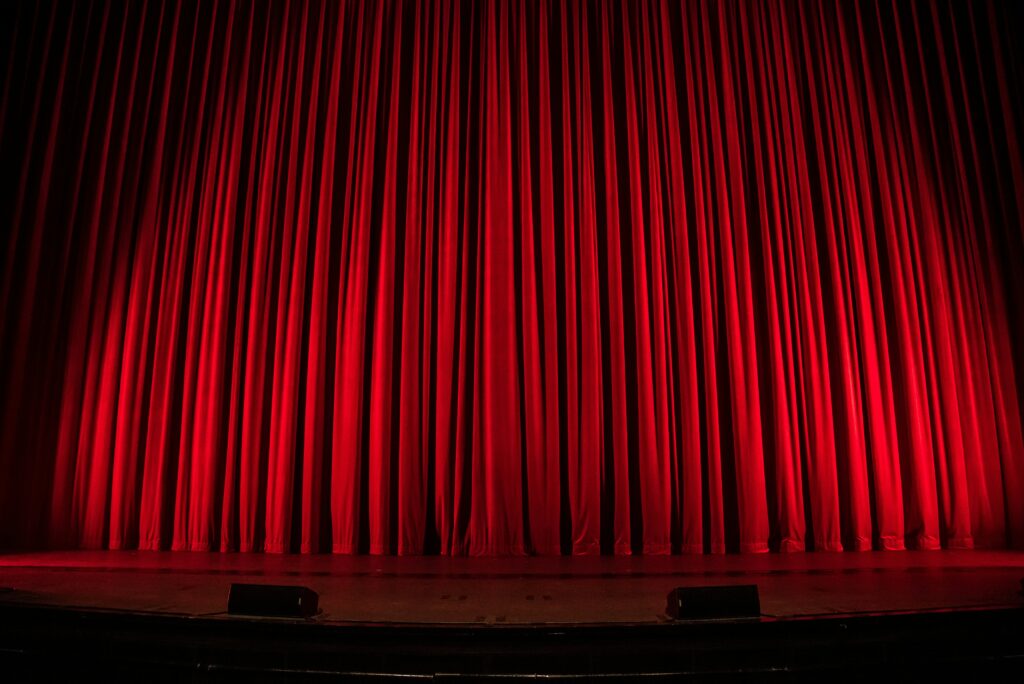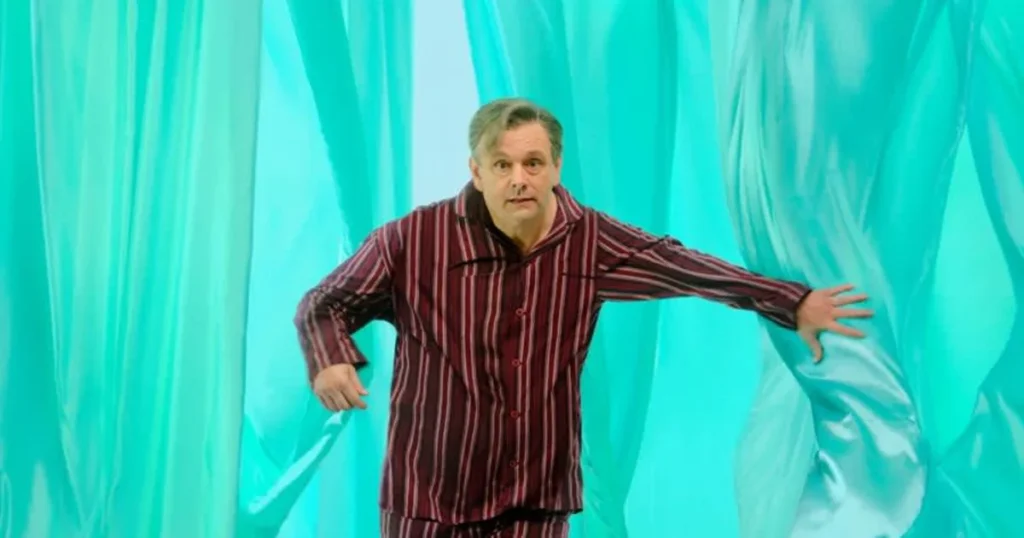Rebecca Wilson speaks to Steffan Donnelly, Artistic Director of Theatr Genedlaethol Cymru, about his role and what’s next for the company.
It’s been just over a year since Steffan Donnelly was appointed Artistic Director of Theatr Genedlaethol Cymru (Theatr Gen) and he has already achieved so much, between a triumphant Eisteddfod run, a new partnership with S4C and a brand-new season announcement. He found time to chat with me in between rehearsals for Rhinoseros by Eugène Ionesco, adapted to Welsh by Manon Steffan Ros, which he is directing.
Rebecca: Pnawn da!
Steffan: Pnawn da!
Rebecca: How are you to start with? I imagine it’s been a crazy year!
Steffan: It’s been busy! It’s been really nice to go through the whole cycle of the cultural calendar of Wales, a big part of that being the Eisteddfod in August, but also our pattern of work. We have our mid-scale touring show every October and then a show for kids in the winter and whilst shows have been on I’ve also been planning my first season. We launched 8 productions over 8 months, which felt like a great statement of intent about the visibility of the company and the range of the work that we’re engaging with. We’re also exploring where that work travels and how we grow and develop our audiences.
Rebecca: Over the past year or so what have your personal highlights been?
Steffan: Getting to know the team. They are brilliant! Welcoming new members of the team on board and celebrating the skills and experience we have as a Welsh-language touring company. The language and touring aspects are as important as the creative and making of the work. I think a sort of brilliantly nervous and exciting moment was the first cohort of shows we put on at the Eisteddfod. We had 5 things happening and I was really excited by the impact Theatr Gen had on the Maes this year. We had people like Owain Gwynn and Heledd Gwynn, Bettrys Jones and Rebecca Killick who had worked on Life of Pi and War Horse.
Rebecca: That’s so exciting! Eisteddfod looked incredible, but how has it been for you personally as well as professionally, moving from London to Wales? And making that transition from being a freelancer who travelled between the two to now being full time working in Wales?
Steffan: It’s been interesting because I’m from Llanfairpwll on Anglesey so although it’s a return for me, I’m actually living in Cardiff, which is different, and then our base in Carmarthen is completely different again! It’s been a really interesting experience to discover more about different regions in Wales but also being based here means you can engage with the work that’s around us and the cultural conversations with freelancers and organisations and audiences. And personally, yes, a massive shift for me moving from being in London for 12 years and running a small company to upping the scale and now running a national company and making new friends here while keeping a connection to London.
It’s not just one artistic director planning a season, it takes so much collaboration and that’s the name of the game.
Rebecca: What have you learnt? I’m sure there are so many things you wanted to do and change, but while dealing with the day-to-day reality of being part of such an established institution, have you discovered any obstacles or challenges?
Steffan: The first great thing was that people within the organisation were very open to my ideas and were excited about change, whereas I have some friends who have taken on roles and that’s taken more time and more convincing. But I was very lucky that there was enthusiasm about what we’re all trying to achieve.
The second thing is that achieving that takes a lot longer, and actually I thought I’d be more frustrated with that pace but when you’re there you discover that pace exists to get it right and to make long-lasting change.
Rebecca: And so, in terms of diversity and trying to be more inclusive, how do you feel you’re learning to achieve that as a company?
Steffan: Drws Agored [the ‘Open Door’ – one on one chats that took place in various locations around Wales and online] was great because people were able to speak directly to the people in the company. I think we can look at these organisations as monolithic things but actually there are 13 of us here at Theatr Gen trying to make theatre travel around Wales as much as we can. We wanted to debunk that myth of being one thing, with one agenda, and one way of working. We’re constantly developing. We now ask every freelancer for their access riders before they begin working with us so we know what that freelancer might need. That feels like a revolutionary step, even though it’s so simple. It’s about the conversation and making space for that dialogue to happen.
Innovative. Informed. Independent.
Your support can help us make Wales better.
When we were doing Drws Agored around Wales, we were engaging with freelancers in an open-ended conversation. As a newcomer to Cardiff, I was learning where the freelancers are, what their interests are, and that has been really helpful in order to plot for seasons. It’s not just one artistic director planning a season, it takes so much collaboration and that’s the name of the game. It’s about who you have in the room and how you platform their voices.
Rebecca: How have you changed, if at all, how you bring new people into the space? Has that shifted since the pandemic?
Steffan: Yes hugely. We’re always looking at how we can bring in voices that have been under-represented within the company in the past. So, we are trying to meet artists, see new work and consider where the gaps are in what we’ve been discussing. The pandemic changed everything. What questions we’re asking, why even do theatre, what’s the impact of it? All of that has fed into what we are trying to do.
I’m excited about potential European work with other countries who have a minoritised language like Galicia, the Basque country, Ireland, Georgia and Scotland.
The next show after Rhinoseros that I’m really excited about is Swyn. It smashes the English-Welsh binary and brings in British Sign Language and Welsh. It’s a global majority-led production and it’s for children. We’re finding ways through that show to open up who comes to watch our children’s shows and how they see themselves represented on stage.
Rebecca: How do you feel about the Welsh theatre scene at the moment and what excites you about its future?
Steffan: It feels like there’s a lot of exciting and progressive work happening and there is a huge amount of freelance talent. Particularly around new work. I’m trying to find models to commission more people. For example, Rwan Nawr [Now Now] will be coming back next year because we were able to commission five short plays and develop five new writers. That inspires me to work as much as possible with a range of freelancers.
I’m excited about potential European work with other countries who have a minoritised language like Galicia, the Basque country, Ireland, Georgia and Scotland. Particularly after Brexit. It’s about looking to Europe and questioning what Wales and the Welsh language’s relationship with it is, not with Westminster and England. I’m inspired by how theatre has developed in Europe as it’s a much more ensemble-focused style of work. Rhinoseros is a perfect example of that as we have a cast of eight, which is one of the biggest shows we’ve had for a while.
I often think we are more connected to Ireland than we are to England at times, especially in North Wales as we’ve got that corridor from Dublin to Bangor. I’m really keen to work with companies beyond our borders as it’s important the Welsh language is seen as this confident and evolving language that is one of the indigenous languages of the UK.
Rebecca: That’s so exciting! I’ve just been bingeing the ground-breaking new Welsh-language show Anfamol available now on BBC iPlayer and S4C Clic. It was originally a Theatr Gen production in 2021 written by Rhiannon Boyle, starring Bethan Ellis Owen. I wonder if you could tell us more about your new partnership with S4C, which started over the Summer?
Steffan: Anfamol is an amazing example of how our work can inspire people and evolve onto other platforms. We’ve done radio plays and now a TV series so this got me thinking that we should have a link with another national company, S4C. I suppose it came from a frustration I had about answering how our work could be seen by the most people possible and when you look at something like [National Theatre’s streaming service] NT At Home and how wonderful that platform is, I then thought well S4C Clic is a well-known, user friendly platform, so why can’t our shows be available to watch with subtitles? This will expand the awareness of the cultural work that’s happening in Wales, not just in English. Another part of the partnership is that we’re looking to develop Y Dyn ‘Nath Ddwyn Nadolig [The Man That Stole Christmas]. We want to create a sequel, a new story inspired by that 80s cult classic film. We hope to present a big musical inspired by it and want to see cross pollination between the theatre work we commission and the series and film work S4C commission. I think it’s a really healthy space to be having a dialogue where we can maximise creativity as well as investment.
Rebecca: As a writer from a minority background, I am very aware of the number of credits you have to have in order to get into the telly world and how difficult that can be. I think theatre is much better at finding and platforming new voices, but I do feel strongly that this gap has to be bridged between theatre and TV, especially in the Welsh-language as it can feel very clique-y. Would you agree?
Steffan: Absolutely. I’m always aware within the company of how many slots I have for new writing which is why something like Rwan Nawr is great as you can suddenly get five mini slots for new writing. So, it’s also about creating more opportunities within your budgetary restraints.
Another thing I’ve learnt moving from being a freelance into a large organisation is to be more aware of really making that investment worthwhile and again maximising it. It’s thinking what the impact of this project is: is it about having loads of audiences, like Parti Priodas [Wedding Party], which sold out, and Mark Drakeford comes to watch it and laughs his head off? Or is it something like Prosiect 40֯C where the focus is less on audience and more about developing new artists to think about creating work in a climate emergency? And how that feeds into our strategy regarding how we tour and the work we’re commissioning.
Generally, the way we interact with freelancers has become a real priority, because without freelancers, there wouldn’t be a Theatr Gen.
Rebecca: How do you feel like you’re encouraging Welsh learners specifically?
Steffan: We worked on our Eisteddfod shows with Welsh learners. We also offer Welsh learners the opportunity to go to Nant Gwrtheyrn (the National Welsh Language and Heritage Centre on the northern coast of the Llŷn Peninsula.) We create packages for new speakers and learners with the National Centre for Learning Welsh. We also use Sibrwd [a free smartphone app delivering short snippets in English] which will be available at every performance of Rhinoseros and captioning is available for our upcoming touring show Ie Ie Ie.
Rebecca: Do you do more outreach now, for example reaching out to Welsh learner classes to encourage people in?
Steffan: Yes, our outreach this year has been turbo-charged! We are working with and booking in specific workshops in schools for Swyn. We are connecting with Welsh language learner groups in different areas. We offer workshops for venues and are building partnerships to ensure that participation is really meaningful and healthy on all our shows. Ie Ie Ie is another brilliant example where we’re doing specific and important work with teenagers in schools about consent.
Rebecca: You were part of the group that set up Cultural Freelancers Wales (formerly Wales Freelance Taskforce) and wrote a report with Marlen Komorowski presenting the impacts of Covid-19 on Wales’ cultural freelancers in 2022. How do you feel you and other companies should be supporting freelancers now?
Steffan: We’ve been listening a lot and before me the company had already responded well to Covid. Suddenly they did loads of digital commissions. So, when I started, that question of what we do digitally came to me.
Then I think about how we keep a close conversation and openness every step of the way when working with freelancers, from contracting to evaluating at the end of the project. I think we’ve taken on some of the recommendations that I made when I was freelance and co-founded Cultural Freelancers Wales. So that’s been super useful. Generally, the way we interact with freelancers has become a real priority, because without freelancers, there wouldn’t be a Theatr Gen. We worked out that we spend £350,000 every year directly on freelancers, which is then spent directly on the economy when freelancers are touring. I think the importance of that investment is also a part of our learning.
Rebecca: Is there anything you directly reported on that you’ve now been able to action?
Steffan: The access riders, better work life balance, better working hours, more communication and getting freelancers on boards was a huge thing. At Theatr Gen we welcomed Elin Parisa Fouladi and Meilir Rhys Williams on our boards, two freelancers who work in theatre, and we have other freelancers too who work in the field of culture and TV. It feels really important to have people at the highest level of our company who really understand theatre and freelancer needs.
Rebecca: If you could wave a magical theatre wand, what three wishes would you make for the next year?
Steffan: Oh my gosh! My first wish would be that we can continue to develop new work and ideas at a good level, so that we can change the type of work we are putting on and show a wider range of styles and voices.
My second wish would be to have more collaboration between organisations in Wales. There’s sometimes a feeling that because the territory is so small and that the Welsh-language audience is quite specific, that it’s sometimes about competition, but for me it absolutely should be about collaboration and it’s odd to feel that there is more curiosity about collaboration from European companies or buildings in London than there sometimes is within Wales. Particularly around the language and meaningful engagement with it.
Robust debate and agenda-setting research.
Support Wales’ leading independent think tank.
There are examples where it’s not like that, we have an excellent relationship with Sherman Theatre, we’re growing a relationship with Theatr Clwyd and are working creatively with National Dance Company Wales on a new project.
Rebecca: Of course, but I think it’s great that you can be honest about that because that is the reality.
Steffan: Yes, it can sometimes feel too siloed.
And then the third wish is (he pauses to think and giggles with excitement), that audiences continue to enjoy and relish and challenge us about our work. We’re seeking to create theatre not just in theatre spaces but also into town halls, with the intent of expanding our audiences, bringing our work closer to the doorstep.
Rebecca: And just before I leave you, how are Rhinoseros rehearsals going?
Steffan: (With the biggest grin I’ve possibly ever seen on a director’s face) It’s really great, thanks! We’ve got an amazing, AMAZING cast who really get what we’re trying to achieve with the show. It’s an absurdist drama which has been adapted incredibly by Manon Steffan Ros. Manon’s ear and eye for interactions and language is really byrlymu, present, in this and we’re working as I said in that European ensemble style. I’m already excited about audiences coming to see it because it’s genuinely something very different. When was the last time a Eugène Ionesco play was put on in Wales? This play has never been put on in Wales, let alone in Welsh. Eugène Ionesco is a writer for our times, he asks all the important questions we are all asking now. How do we listen? What’s happened to discourse? How do we fight back against extremism? But he does this with such a glint in his eye, which Manon has taken and made into a beam on the face! It’s so cheeky and it embraces the chaos of living.
All articles published on the welsh agenda are subject to IWA’s disclaimer. If you want to support our work tackling Wales’ key challenges, consider becoming a member.





